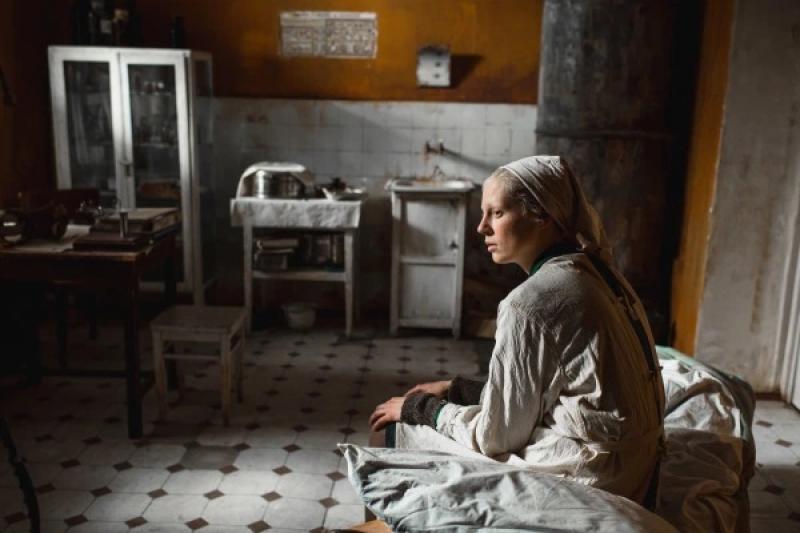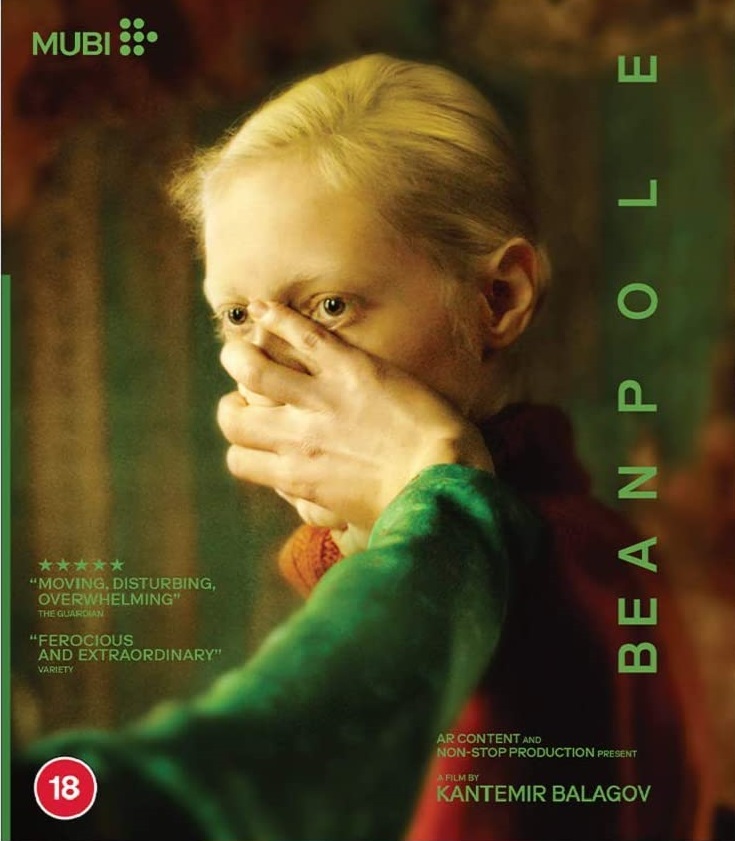Blu-ray: Beanpole | reviews, news & interviews
Blu-ray: Beanpole
Blu-ray: Beanpole
Bleakness of story mediated by fragile visual beauty in outstanding Russian arthouse period offering

Kantemir Balagov’s second feature announces the arrival of a major new talent in arthouse cinema.
Set in 1945 in Leningrad, months after the end of the Great Patriotic War at a time when any elation of victory has given way to an understanding that the future will be one of harsh survival, the film’s aesthetic somehow foregrounds deprivation: Balagov’s script, co-written with Alexander Terekhov, is notably spare, and the film’s only music diegetic, an effect that’s enhanced by nuanced sound design.
 It’s a stark background for the film’s remarkable central pairing, Viktoria Miroshnichenko and Vasilisa Perelygina as Iya and Masha, two friends whose wartime experience has brought their lives as close together as is possible to imagine (Balagov doesn’t hurry to reveal just what it is that links them so closely). It’s an unlikely bond that’s somehow enhanced by their physical differences – Iya is the “beanpole” of the title, tall to the extent of ungainliness (a sense that’s there more particulalry in the film’s Russian title, “Dylda”). Miroshnichenko has the face of a young Tilda Swinton, with an extra Slavic luminous innocence, and she’s often abstracted, while as the slighter, shorter, more humorous Masha Perelygina is always engaged and purposeful. Iya’s awkwardness is enhanced by the periodic semi-paralytic fits that are a legacy of wartime trauma, which in turn bring about the film’s most desperate scene (it's conveyed so laconically by the director that viewers may initially barely register what’s happening, until the crushing impact hits home).
It’s a stark background for the film’s remarkable central pairing, Viktoria Miroshnichenko and Vasilisa Perelygina as Iya and Masha, two friends whose wartime experience has brought their lives as close together as is possible to imagine (Balagov doesn’t hurry to reveal just what it is that links them so closely). It’s an unlikely bond that’s somehow enhanced by their physical differences – Iya is the “beanpole” of the title, tall to the extent of ungainliness (a sense that’s there more particulalry in the film’s Russian title, “Dylda”). Miroshnichenko has the face of a young Tilda Swinton, with an extra Slavic luminous innocence, and she’s often abstracted, while as the slighter, shorter, more humorous Masha Perelygina is always engaged and purposeful. Iya’s awkwardness is enhanced by the periodic semi-paralytic fits that are a legacy of wartime trauma, which in turn bring about the film’s most desperate scene (it's conveyed so laconically by the director that viewers may initially barely register what’s happening, until the crushing impact hits home).
Balagov sets the pattern of these two womens’ lives between the war veterans’ hospital where they work and the communal apartment that is Iya’s home (echoes there, surely, of Alexei German’s Khrustalyov, My Car! in the chaotic, polyphonic interiors). It’s a world that juxtaposes life and death in every sense, new beginnings – evident in the growing desperation with which Masha sets about conceiving a child – set off against literal endings, seen most starkly when Iya accedes to the pleas of a patient, paralysed from the neck down, to terminate his life.
There’s an extreme, almost bruising tenderness in the way that Balagov and his cast capture such relationships. The bleakness here is never wiful – something you can't always say of such new Russian arthouse fare – and Beanpole offers an element of amelioration of its darkness in the range of visual textures with which cinematographer Ksenia Sereda makes her mark (younger than her director, she delivers work here that’s as fully realised as anything any more experienced DP might come up with). Balagov went back on his initial intention to make the film in black and white, creating instead a visual palette that’s dominated by greens, reds and mustard-yellows, hues that are always restrained and somehow fragile, and striking in their almost painterly beauty; some scenes, one in a womens' bathhouse particulalry, infuse a feel of candlelight into otherwise harsh interiors, suggesting nothing less than the Dutch Old Masters. In an elusive but engrossing way, it's kind of visual reprieve.
This MUBI release comes without extras, and it’s worth tracking down what Balagov has said about his film, his appearances at the New York Film Festival 2019 and at Film Forum (audio only) among the best places to start. Significantly, he cites the starting-point for the film as being his reading Svetlana Alexievich’s 1985 The Unwomanly Face of War, in which the Belarusian Nobel laureate recorded oral documentary testament from female WWII survivors. Balagov has studied under the tutelage of Russian master Alexander Sokurov, who, we learn, typically exhorts his pupils to study literature as much as cinema (thus, that quintessential Russian writer Andrei Platonov is another influence acknowledged by the young director). But any such references ultimately do little to explain the concentrated intensity, the sheer maturity that Balagov has achieved here: his is a career to be followed with urgent interest.
rating
Share this article
The future of Arts Journalism
You can stop theartsdesk.com closing!
We urgently need financing to survive. Our fundraising drive has thus far raised £49,000 but we need to reach £100,000 or we will be forced to close. Please contribute here: https://gofund.me/c3f6033d
And if you can forward this information to anyone who might assist, we’d be grateful.

Subscribe to theartsdesk.com
Thank you for continuing to read our work on theartsdesk.com. For unlimited access to every article in its entirety, including our archive of more than 15,000 pieces, we're asking for £5 per month or £40 per year. We feel it's a very good deal, and hope you do too.
To take a subscription now simply click here.
And if you're looking for that extra gift for a friend or family member, why not treat them to a theartsdesk.com gift subscription?
more Film
 Can I get a Witness? review - time to die before you get old
Ann Marie Fleming directs Sandra Oh in dystopian fantasy that fails to ignite
Can I get a Witness? review - time to die before you get old
Ann Marie Fleming directs Sandra Oh in dystopian fantasy that fails to ignite
 Happyend review - the kids are never alright
In this futuristic blackboard jungle everything is a bit too manicured
Happyend review - the kids are never alright
In this futuristic blackboard jungle everything is a bit too manicured
 Robert Redford (1936-2025)
The star was more admired within the screen trade than by the critics
Robert Redford (1936-2025)
The star was more admired within the screen trade than by the critics
 Blu-ray: The Sons of Great Bear
DEFA's first 'Red Western': a revisionist take on colonial expansion
Blu-ray: The Sons of Great Bear
DEFA's first 'Red Western': a revisionist take on colonial expansion
 Spinal Tap II: The End Continues review - comedy rock band fails to revive past glories
Belated satirical sequel runs out of gas
Spinal Tap II: The End Continues review - comedy rock band fails to revive past glories
Belated satirical sequel runs out of gas
 Downton Abbey: The Grand Finale review - an attemptedly elegiac final chapter haunted by its past
Noel Coward is a welcome visitor to the insular world of the hit series
Downton Abbey: The Grand Finale review - an attemptedly elegiac final chapter haunted by its past
Noel Coward is a welcome visitor to the insular world of the hit series
 Islands review - sunshine noir serves an ace
Sam Riley is the holiday resort tennis pro in over his head
Islands review - sunshine noir serves an ace
Sam Riley is the holiday resort tennis pro in over his head
 theartsdesk Q&A: actor Sam Riley on playing a washed-up loner in the thriller 'Islands'
The actor discusses his love of self-destructive characters and the problem with fame
theartsdesk Q&A: actor Sam Riley on playing a washed-up loner in the thriller 'Islands'
The actor discusses his love of self-destructive characters and the problem with fame
 Honey Don’t! review - film noir in the bright sun
A Coen brother with a blood-simple gumshoe caper
Honey Don’t! review - film noir in the bright sun
A Coen brother with a blood-simple gumshoe caper
 The Courageous review - Ophélia Kolb excels as a single mother on the edge
Jasmin Gordon's directorial debut features strong performances but leaves too much unexplained
The Courageous review - Ophélia Kolb excels as a single mother on the edge
Jasmin Gordon's directorial debut features strong performances but leaves too much unexplained
 Blu-ray: The Graduate
Post #MeToo, can Mike Nichols' second feature still lay claim to Classic Film status?
Blu-ray: The Graduate
Post #MeToo, can Mike Nichols' second feature still lay claim to Classic Film status?

Add comment